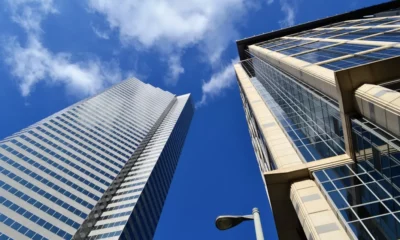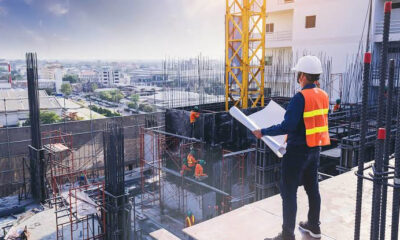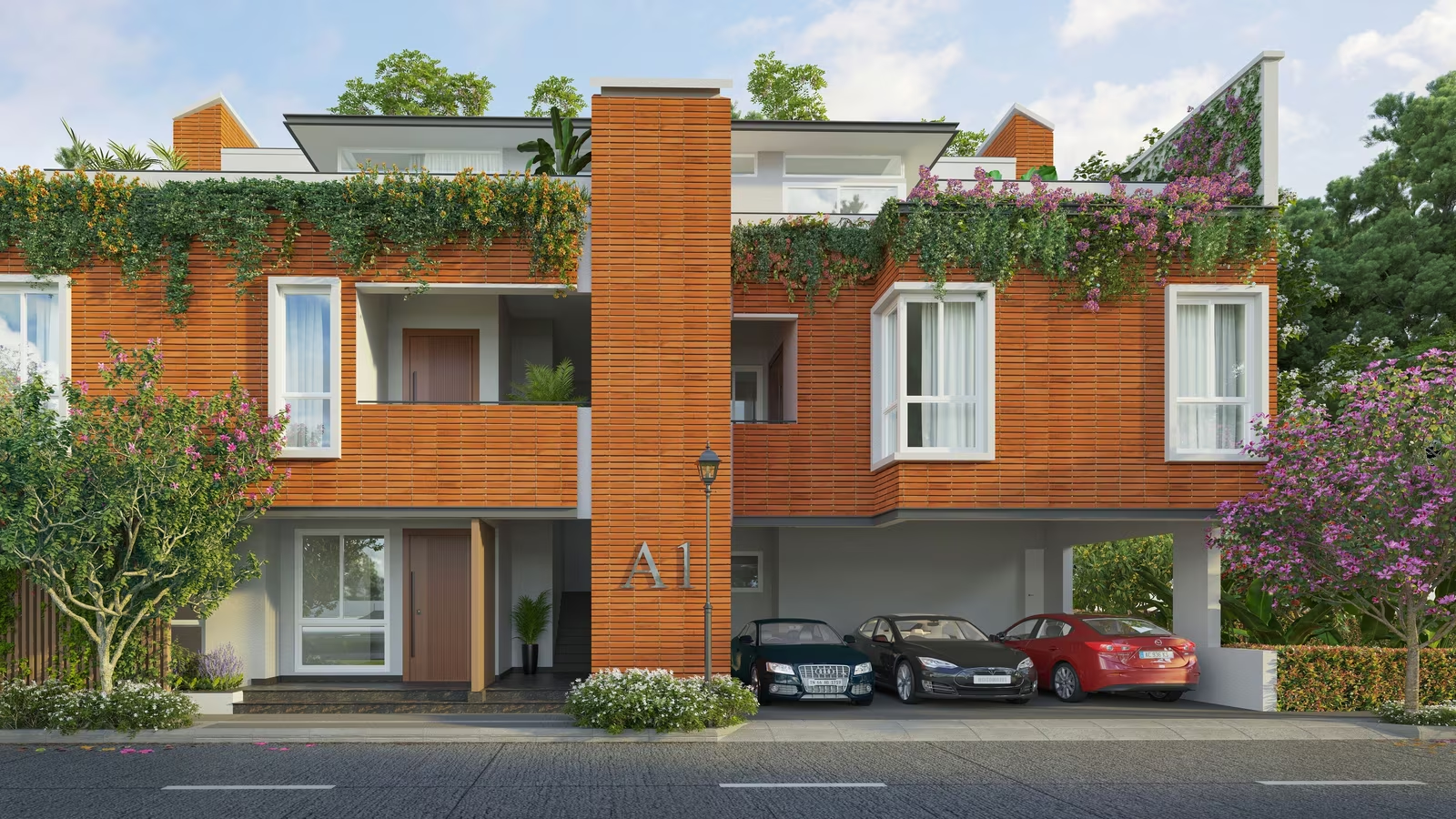Bytes
Adieu 2020 Welcome 2021 Realty stakeholders offer assessment


The year that’s just behind us has been a great learning exercise. The coronavirus pandemic that struck the world in the beginning of 2020 wreaked havoc upon businesses across the spectrum, the real estate sector being no exception. The prolonged lockdowns, consequent migration of labour force and an overall halt to economic activity brought the sector to a standstill till the end of the first quarter. Once the unlock process started and people learnt living with the pandemic, the realty sector also picked threads and started coming to terms with the new reality. With transformed consumer preferences and new health paradigm in place, the real estate industry also evolved – it changed its business practices, adopted digital modes with greater vigour and came up with offerings suiting the new environment. As the unprecedented year headed towards the end, the industry also neared normalcy levels.
The New Year 2021 heralded the dawn of a fresh hope. With the world having better adjusted to the new reality, the new vaccines to fight the pandemic have added to the overall confidence. Preserving the precious lessons of 2020 intact, the real estate industry is now looking forward to the New Year with renewed hope and fresh confidence. The assessment of the past year and outlook for the year ahead, as articulated by key stakeholders, confirms the fact the real estate industry is well prepared to handle the challenges ahead and emerge triumphant.
The following is the edited version of the opinions expressed by various players on the year gone by and the one which has just made a start:


Anurag Mathur CEO, Savills India
“We expect the real estate market to witness improvement in 2021 though it would be difficult to quantify the growth at the moment. On the commercial office front, we expect leasing activity to improve, provided there are no subsequent waves of the pandemic and no further damage to the economy. With rising economic activity, we expect office space absorption to pick up soon. As far as the residential market is concerned, we are already seeing demand gradually returning especially in the fourth quarter of 2020. We hope to see the momentum continue in the next year as well. There are several factors for our positive outlook. As we can see, organisations have now figured out ways to conduct their businesses during the pandemic in contrast to its initial days.”


Uddhav Poddar MD, Bhumika Group
“The Indian economy is bouncing back very strongly, this combined with the various Government initiatives to boost demand such as low interest rates and reduction of taxes, are likely to drive investments. With the economy growing, demand in retail and commercial is also likely to gain momentum. We also expect investors to invest once again into commercial and retail assets due to these factors and also as other stable asset classes giving very low returns. Commercial and retail real estate investments provide ROI in the short and long-term and this is unique only to this asset class.”


Pradeep Aggarwal, Chairman, Signature Global
“The market for affordable housing is robust, and in the coming months, there will be more movement. People have realised the importance of owning a home, and this feeling is going to persist. We are coming up with multiple projects, and the response that we are getting is an indication that the affordable housing segment will not face any problem.”


Mohit Goel CEO, Omaxe Ltd
“The overhang of subdued demand from the last quarter of 2019 continued into 2020 and with the COVID-19 pandemic-induced lockdown in March, the sector went from bad to worse. The migration of labour and disruption in supply of raw material saw a stoppage in construction activities. Rent negotiations by retailers amidst no/low footfall in malls and WFH adversely affected the retail and office segments. On the back of the Government stimulus and RBI’s liquidity measures, there was some uptick in demand post the partial opening of the economy. Nevertheless, the positives that have emerged from the COVID-19 crisis will form the cornerstone of the coming decades of growth in the real estate sector and overall Indian economy.
The reverse migration led to the emergence of heightened demand for homes in Tier-2/3 cities including rentals. Demand for bigger homes inside an open, hygienic and green complex with facilities like healthcare, daily necessities and everyday rejuvenation within walking distance formed the crux of increased demand for branded and reputed developers who would not just provide value-for-money products and services but also have the ability to deliver those projects. As far as the office segment is concerned, it will remain affected as rationalisation of workspace by the corporate sector has led to a pile-up of inventory that is expected to take two-three years to clear.”


Salil Kumar Director, Assotech Realty
“In 2020, the entire world suffered but after the dark tunnel, we have a silver lining because the vaccine has evolved and it will be placed in the market shortly. So we expect 2021 to be a silver year for the entire industry because if you see the economic figures, India will be the most benefited country in terms of GDP growth in the year subsequent to vaccinations. We are hoping that the office market will come back, residential will boom, and the entire real estate will do very good.”


Nagaraju Routhu CEO, Hero Realty
“The year 2020 has been a great learning period in terms of reforming our business strategies and revisiting our contingency plans to prepare ourselves better for tackling setbacks caused due to the lockdown. For the real estate specifically, the year has been slow yet stable. In the first two months, the sector was functioning as usual with residential segment going strong. The lockdown announcement led to complete shutdown of industries and unprecedented migration of labour. Real estate witnessed the new dawn with digital integration in terms of virtual tours and online sales etc. Gradual unlocking of states and industries helped the sector go back to normalcy. The festive months were bright in terms of project deliveries and possessions.”


Achal Raina COO Raheja Developers
“The year 2020 has proven crucial for the real estate sector as it has transformed almost every bit of operations that were being practiced from construction sites to corporate levels. While the first quarter was progressing at its usual pace, the unprecedented lockdown derailed the system for a month or so. The repeated extensions in lockdown made every reputed developer prepare for the new normal. This remote working culture limited a good number of activities to an extent, but it also helped us seek out alternatives which have now become long-term practices due to the flexibility they offer. The extended support from authorities helped us maintain positive stance. Plotted developments and affordable housing witnessed increased enquiries and stable demand respectively.”


Vijay Verma CEO, Sunworld Group
“Repo rate being slashed and RERA timeline extension were pivotal for the real estate sector in 2020. RTMI units became the most preferred choice due to low home loan interest rates. Also they came with definite timeline for delivery and had reduced risk involved. Sales and enquiries numbers at Sunworld were stable even in the beginning phases of unlock.”


Ankit Kansal, Co-Founder & MD, 360 Realtors
When CY20 started, the industry was hopeful of a turnaround. In line with the expectations, the industry registered promising growth in the initial months. However, as the Black Swain event spread like a wildfire, markets started staggering, with a drastic slowdown in sales. The industry showed some limited manoeuvering with embracing the digital medium. The repo rate cuts and liquidity infusion by the Government were also helpful. The developer fraternity also introduced attractive payment plans to arrest any steep decline in sentiments. Once the lockdown was suspended, markets started reviving. Finally, in the last quarter, the previous year’s growth numbers were restored and the industry reached near normalcy. Overall, it was a tough year for real estate, as for most of the industries. However, the year also saw a growing thrust towards digitisation and technology adoption, chronicling a new era in the industry.”


Ashish Bhutani MD, Bhutani Infra
“The year 2020 has been a great year of realisation and learning for the commercial real estate players. Public spaces such as office complexes, malls and retail centres were never designed keeping in mind the distancing and ample space for smooth movement of the visitors. The pandemic made the developers rethink and rework upon the areas where the commercial realty was lacking, in terms of tech-based integrations via automations, contactless services, etc. The New Year looks great for the commercial real estate as good number of NRIs is willing to invest in India. Ease in FDI norms, transparency of RERA and tech-driven tools for real estate have made the process more welcoming.”


Rajat Goel JMD, MRG World
“The real estate market is slated to move towards recovery post-unlock and the policy measures introduced by the apex bank reflect optimism about economic growth. The RBI was of the view that the economy will register a positive growth in the October-December festive quarter if the economic upturn generated after lockdown sustained till the end of the year. This has proven to be true, with a good amount of buyer’s interest being driven towards affordable housing. It has emerged as the most preferred segment with respect to the amenities offered by developers at reasonable prices.”


Prateek Mittal Executive Director, Sushma Group
“The real estate sector’s demand and supply is highly influenced by the ongoing social and economic situations. The beginning few months of unlock witnessed interest towards property investment rising in Tier II/III cities. Buyers here were getting inclined towards well-planned projects and better infrastructure. We registered an increase of around 50 pc in site visits as compared to pre-COVID times for the months of August and September. We have managed to sail through this discouraging time, with strong determination.”


Raman Gupta Director (Branding and construction), GBP Group
The year 2020 has been a year of unique trends in the real estate sector. The reverse migration among the working professionals from metros and NRIs led to an increase in demand of property for Tier-II and Tier-III cities. When it comes to analysing the northern region, Tricity and its peripheries witnessed an upsurge laying the foundation for a market that is going to grow exponentially from here.”


Reeza Sebastian President, Residential Business, Embassy Group
“The year 2020 has seen the evolution of real estate as the preferred investment class. It may seem like a paradox, but the pandemic has catalysed housing demand rather than suppressing it. Homebuyers have understood the important role that homes play in ensuring their wellbeing, as well as their physical and emotional security. The outbreak of the pandemic brought to the forefront several new challenges for the industry. The role of technology expanded in real estate with developers leveraging 3D walkthroughs and Virtual Reality to improve customer experience, sustain the momentum of sales digitally while additionally focusing on improving construction methodologies.”


Ketan Sengupta CEO, Bengal Peerless Housing Development Company
“The demand for real estate could show signs of pick-up once the pandemic settles. With the unlocking of various activities, this industry will take about a year to get back on its feet. The real estate sector has to understand irreversible changes in consumer values, habits, consumption patterns, social behaviours and preferences.”


Vinayak K Deshpande Managing Director, Tata Projects Ltd
“Driven by the pandemic and resulting lockdown, we migrated to new digital tools and processes both on and off ground to improve efficiency. We embraced remote working methods to meet the needs of our customers and learned to operate with minimal overhead expenses. These measures helped us to enhance our performance amidst crisis. Infrastructure projects have long gestation periods mainly ranging from three to six years and therefore short-term disruptions did not have a major impact on the overall industry during 2020.
If India has to attain the goal of becoming a $5-trillion GDP by 2024, then we have to look beyond challenges of 2020 and grasp opportunities in 2021 so that the full potential of the nation’s economy can be reached. As most infrastructure projects are Government-funded and the nation needs good quality infrastructure, the year 2021 looks promising. In the year ahead, there will be increased deployment of machines at project sites towards ensuring timely completion. There will be enhanced adoption of technology to find solutions.”


Sanjay Gupta Chairman, APL Apollo
“Undoubtedly, 2020 will be remembered as a traumatic year as COVID-19-induced downturn pushed the Indian economy into a tailspin and the entire industrial landscape in the country remained marred with slowdown, labour crisis and shrinking demand. However, these challenges apart, APL Apollo has performed exceptionally well and shown great resilience. It continued to maintain its dominant leadership in the structural steel tube segment and that demonstrates our ability to quickly adapt to the changing market situation and pioneer new innovations.”


Aditya Kushwaha CEO & Director, Axis Ecorp
“COVID-19 threw some unprecedented challenges for the industry throughout 2020. However, recently there has been a good spike in the recovery of the real estate sector and demand for home loans has gone up evidently. With policy support from the Government, the sector is displaying signs of growth, and sales numbers are increasing across cities. Keeping a positive outlook for the upcoming Budget, we are hopeful to seeing relaxation in income tax norms, introduction of single-window clearance and GST reforms.”


Niranjan Hiranandani National President, Naredco
“The pent-up demand due to the multiplier effect of policy reforms will fuel sustainable growth in 2021. The Government spend on public infrastructure has to scale up manifold as that will attract more investments and lead to further job creation. Demand for owned houses has gained traction post-pandemic and adaptation of digitisation, product redesigning and upskilling of human capital will be focal points for business continuity plans. The commercial real estate growth trajectory will be resuming once the GDP growth is on a positive scale. The supply chain disruption has opened floodgates for the logistics sector to fix the gaps and flourish. Other sunrise sectors like Industrial Parks and Data Centres will see pent up demand in the year ahead.”


Dhruv Agarwala Group CEO, Housing.com, Makaan.com, and Proptiger.com
“It was a tough year for the real estate sector. After the first two months of January and February, housing sales were adversely impacted until September because of the lockdown and negative consumer sentiment. However, sales started to recover from October onwards on account of pent-up demand as well as seasonal upswing in demand because of the festival season. Still, housing sales in 2020 across major cities will be lower than the previous year. We expect that the increase in sales seen since October will gain further momentum in the coming months on account of low interest rates, stagnant housing prices and attractive offers by developers. Demand in 2021 is likely to recover to 2019 levels and may even surpass it if there are no unforeseen negative events.
On the positive side, while the pandemic hit sales, it accelerated the much-needed adoption of digital tools in Indian real estate and led to a record increase in online traffic to digital real estate platforms. Moreover, the forced work-from-home environment because of COVID-19 boosted housing demand in Tier-II and III cities.”
-



 News4 weeks ago
News4 weeks agoKW Delhi 6 Mall Onboards New Brands
-



 News3 weeks ago
News3 weeks agoGodrej Properties Sells Rs 3k cr+ Homes of Godrej Zenith, Gurugram, within 3 days
-



 News4 weeks ago
News4 weeks agoCommercial Realty Gets Tech Savvy: Fast Construction, Enhanced Convenience
-



 News3 weeks ago
News3 weeks agoRBI’s Status Quo on Key Policy Rates to Help Maintain the Real Estate Growth Momentum, Say Industry Stalwarts
-



 News2 weeks ago
News2 weeks agoOlive Announces Dhruv Kalro as Co-Founder
-



 News1 week ago
News1 week agoNoida’s High-Rise Societies Face Multiple Challenges Despite Rapid Urban Growth
-



 News3 weeks ago
News3 weeks agoGodrej Properties Sells 5000+ Homes of Rs 9.5 cr in Q4FY24, Bookings up 84% YoY
-



 News2 weeks ago
News2 weeks agoVestian: Domestic Investors Dominate Institutional Investments in Jan-Mar’24
















